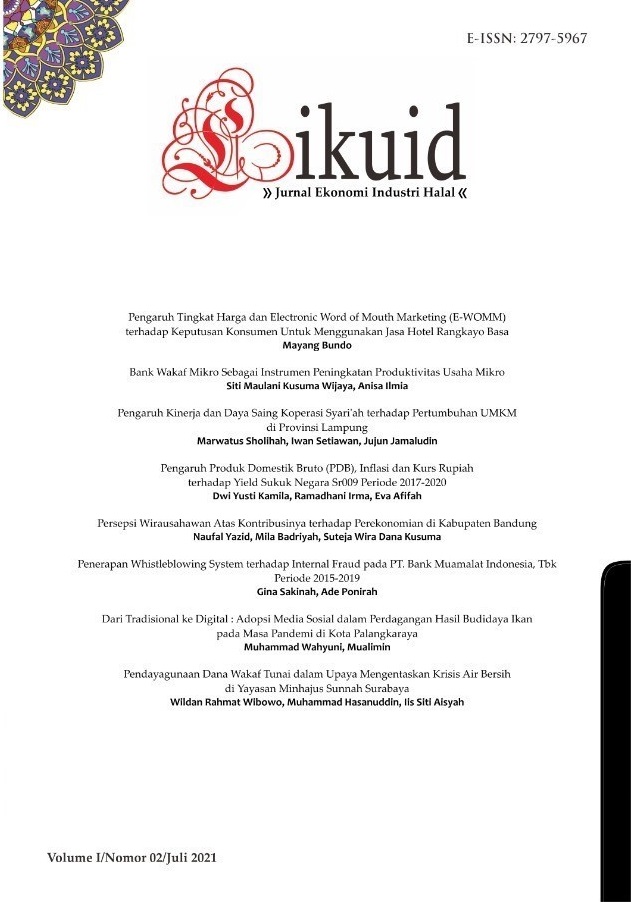PENGARUH PRODUK DOMESTIK BRUTO (PDB), INFLASI DAN KURS RUPIAH TERHADAP YIELD SUKUK NEGARA SR 009 PERIODE 2017-2020
DOI:
https://doi.org/10.15575/likuid.v1i2.14158Abstract
The sale and purchase of Islamic bonds or sukuk products in the secondary market is more volatile, the profit which is the reference for investors in the secondary market is generally yield to maturity (YTM) or often called yield. According to Laily Fitriyah et al. in their research, the economic conditions in a country can be an important reference for investors' decisions in that country, this is in line with the theory pioneered by Rosel in 1963, namely the Arbitrage Pricing Theory that bond yields can be influenced by macroeconomic factors. Gross Domestic Product (GDP), inflation and the rupiah exchange rate are some branches of macroeconomics that can describe the economic condition of a country. This study uses the Vector Error Correction Model (VECM) data analysis method. The data processing tools used are Eviews9 and Microsoft Excel 2019 to support initial data processing. The VECM estimation results show that in the short term only the rupiah exchange rate variable has a significant negative effect on the yield of SR09, GDP has an insignificant negative effect and inflation has an insignificant positive effect on the yield of SR009. Meanwhile, in the long term, all independent variables have a significant negative effect on the yield of SR009.
Keywords: GDP, Inflation, Rupiah Exchange, Yield.
References
Buku
Ali, Rama, Sistem Ekonomi Dan Keungan Syariah (Jakarta: Pusat Penelitian dan Penerbitan (puslitpen) UIN Syarif Hidayatullah, 2015)
D, Nachrowi, and Hardius Usman, Pendekatan Populer Dan Praktis Ekonometrika Untuk Analisis Ekonomi Dan Keuangan (Jakarta: Lembaga Penerbit Fakultas Ekonomi UI, 2006)
Eduardus, Tandelilin, Analisis Investasi Dan Manajemen Risiko, 1st edn (Yogyakarta: BPFE, 2001)
Mankiw, N Gregory, and Dkk, Pengantar Ekonomi Makro (Jakarta: Salemba Empat, 2008)
Sukirno, Sadono., Makro ekonomi Modern Perkembangan Pemikiran Dari Klasik Hingga Keynesian Baru (Jakarta: Raja Grafindo, 2005)
———, Makro ekonomi Teori Pengantar (Jakarta: Raja Grafindo, 2013)
Artikel,Jurnal, Majalah dan Internet
Astriana Dewi, Nanda, ‘Pengaruh Fakator Suku Bunga Sbi Dan Perubahan Nilai Tukar Rupiah Terhadap Yield Obligasi Korporasi Yang Terdaftar Di Bursa Efek Indonesia Periode 2012 Kuartal 1 – 2015 Kuartal 2’, 2016
Fitriyanti, ‘Analisis Pengaruh Variabel Makroekonomi Terhadap Tingkat Imbal Hasil Sukuk Negara Seri Ritel Di Indonesia (Periode Tahun 2011-2014)’, 2014
Laili Fitriyah, Nida dan Nafik Muhamad, ‘Determinan Terhadap Yield Sukuk Ritel Negara’, Jurnal Ekonomi Syariah Teori Dan Terapan Vol. 6 No., 53.9 (2019), 1741–55 <https://doi.org/10.1017/CBO9781107415324.004>
Nurfauziah dan Setyarini, Adistien Fatma., ‘Analisis Faktor-Faktor Yang Mempengaruhi Yield Obligasi Perusahaan (Studi Kasus Pada Industri Perbankan Dan Industri Finansial).’, Jurnal Siasat Bisnis, 2.9 (2004), 241–56
Saputra, Tiyas Ardian, ‘ANALISIS FAKTOR-FAKTOR YANG MEMPENGARUHI YIELD OBLIGASI KONVENSIONAL DI INDONESIA(Studi Kasus Pada Perusahaan Listed Di BEI)’, Jurnal Studi Manajemen Organisasi, 11.1 (2014), 67–77 <https://doi.org/10.14710/jsmo.v11i1.13163>
Yuliana, Debora, ‘Pengaruh BI Rate, Inflasi, Dan Pertumbuhan Pendapatan Domestik Bruto (PDB) Terhadap Yield Surat Utang Negara (SUN) Periode 2010:07-2015:12’, Jurnal Ilmiah Mahasiswa FEB Universitas Brawijaya, 4.2 (2016), 1–9











